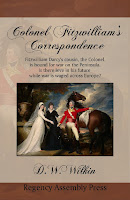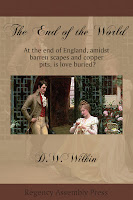by David William Wilkin
This month my contribution is more on what occurred during the first Boer War of 1880-1881--a war that did not last very long, resulted in a British defeat and, of course, did not resolve enough, so that there eventually was a second war that was much worse for all.
 |
| The Transvaal War, The Battle of Majuba Hill by Richard Caton Woodville |
The Battle of Majuba Hill would prove to be the deciding battle of the war. Up to this point the Boers were very much having their way with the British. The Boers believe the British were thinking of trying to outflank them at Laing's Nek. Major-General Sir George Pomeroy Colley moved his troops up the 2000 foot tall hill on the night of the 26th--a feat, for the Boers did not think the hill was scalable.
There now were 405 British soldiers atop the hill--men of the 58th Regiment, the 92nd (Gordon Highlanders) and a even a small naval brigade from the HMS Dido. Most of the troops though were inexperienced and the regiments had not seen any action since the Crimean War (which ended in 1856, twenty five years before.)
 |
| The aid post on Majuba Hill. Lance Corporal Turner winning the V.C. |
Colley was urged and advised to have the men dig in, but he ignored that. He also did not bring any artillery, which might have been difficult in any case. He seems to have believed that the mere sight of the British troops in a position of advantage would cause the Boers to retreat. The Boers, under Nicolas Smit, gathered together at least 450 men to attack the hill.
Daybreak was at 4:30. The Highlanders covered a wide perimeter, and a handful were at Gordon's Knoll (Kopje) on the right of the summit.
The Boers began to panic fearing that the British had artillery on the hill. They had been taken by surprise and had not known of the soldiers until the Gordons began to yell and shake their fists. Three Boer parties began an advance on the hill. The groups were led by Field Cornet Stephanus Roos, Commandant D.J.K. Malan and Commandant Joachim Ferreira. The Boers, as they had proven in all the previous battles, were much better marksmen than the British infantry. (At about 10 to one efficiency in the previous fights.) With their skill, the Boers kept the British from attacking while they got into position. At 12:45 Ferreira's men began a great rate of fire on the exposed knoll and captured it. Colley had been in his tent and was informed that the Boers were advancing but took no action.
Over the next hour, the Boers came over the top of the British Line and engaged at long range, not hand-to hand. The ability of the Boers to sharpshoot and keep the British from using their bayonets was telling again. The British were not ready for this type of fighting (especially with units that had not seen action for 25 years). Now the British morale, since they were suffering all the casualties and the Boers were suffering almost none, failed. The British began to flee. The officers had done little during the attack till then. They didn't issue orders or direct the fighting. The British line collapsed and many fled from the Hill, with the Gordons standing firm the longest. When they were routed though the battle was over.
The Boers then further launched an attack the destroyed what remained of the British line. The Thin Red Line was broken.
 |
| Major General Sir George Pomeroy Colley |
Colley attempted to order the men into a fighting retreat. He was shot and killed by a Boer marksman. The rest of the force fled down the rear slopes of Majuba, as many more were hit by the Boers who now had taken the summit and were shooting down at the foe.
The 15th King's Hussars and the 60th Rifles tried to stage a rearguard but it failed. They had marched from Mount Prospect but had little impact. 285 British troops were killed, captured or wounded, including Captain Cornwallis Maude (KIA), son of the 1st Earl de Montalt (who was a government minister).
Donald Denoon Southern Africa Since 1800, 1972
The 15th King's Hussars and the 60th Rifles tried to stage a rearguard but it failed. They had marched from Mount Prospect but had little impact. 285 British troops were killed, captured or wounded, including Captain Cornwallis Maude (KIA), son of the 1st Earl de Montalt (who was a government minister).
Some of the British wounded were surrounded by the Boers and were able to give an account of what they saw. Many of the Boers who had defeated them were just farm boys armed with rifles. The British sense of prestige had assured those of the empire that they would easily and quickly be victorious. They found it hard to reconcile that when their professional army was defeated by such as the Boers. This was the first significant defeat since the American War of Independence for the British. Previous defeats since that war had always seen the British roaring back to victory in such wars. This was the last in a string of defeats over three months from which the British could not easily recover. It may have been philosophically the beginning of the end of the British Empire.
Research
Ian Knight The Boer Wars (1) 1836-98, 1996
Joseph Lehmann Echoes of War, The First Boer War, 1972
Donald Denoon Southern Africa Since 1800, 1972
* * *
 Mr. Wilkin writes Regency Historicals and Romances, Ruritanian (A great sub-genre that is fun to explore) and Edwardian Romances, Science Fiction and Fantasy works. He is the author of the very successful Pride & Prejudice continuation; Colonel Fitzwilliam’s Correspondence. He has several other novels set in Regency England including The End of the World and The Shattered Mirror.
Mr. Wilkin writes Regency Historicals and Romances, Ruritanian (A great sub-genre that is fun to explore) and Edwardian Romances, Science Fiction and Fantasy works. He is the author of the very successful Pride & Prejudice continuation; Colonel Fitzwilliam’s Correspondence. He has several other novels set in Regency England including The End of the World and The Shattered Mirror. His most recent work is the humorous spoof; Jane Austen and Ghosts, a story of what would happen were we to make any of these Monsters and Austen stories into a movie.

 And Two Peas in a Pod, a madcap tale of identical twin brothers in Regency London who find they must impersonate each other to pursue their loves.
And Two Peas in a Pod, a madcap tale of identical twin brothers in Regency London who find they must impersonate each other to pursue their loves.He is published by Regency Assembly Press
The links for all locations selling Mr. Wilkin's work can be found at the webpage and will point you to your favorite internet bookstore: David’s Books, and at various Internet and realworld bookstores including the iBookstore, Amazon, Barnes and Noble, Smashwords.
And he maintains his own blog called The Things That Catch My Eye where the entire Regency Lexicon has been hosted these last months as well as the current work in progress of the full Regency Timeline is being presented.
You also may follow Mr. Wilkin on Twitter at @DWWilkin
Mr. Wilkin maintains a Pinterest page with pictures and links to all the Regency Research he uncovers at Pinterest Regency-Era





